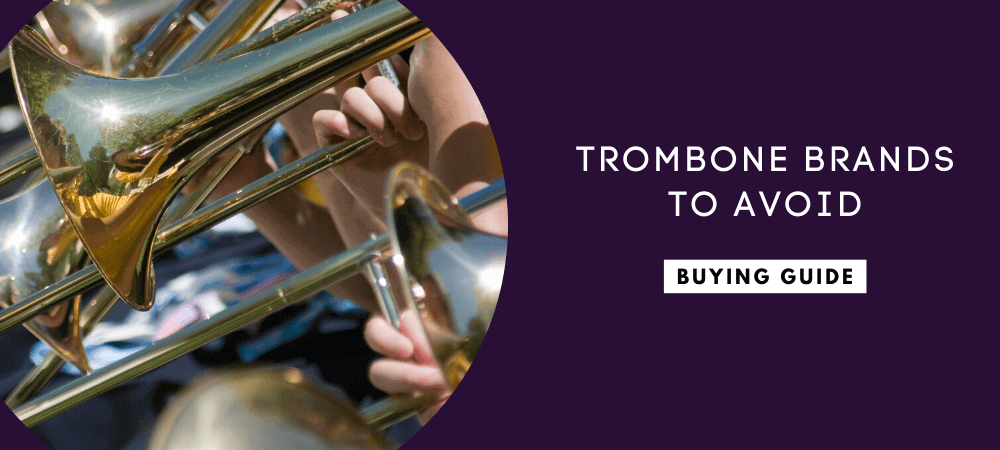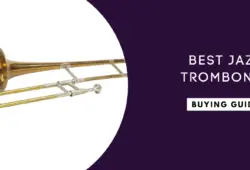It’s just the way things are.
Some brands are known for making terrible quality instruments right off the bat.
Some trombone bands are of such inferior quality that the instrument is basically falling apart before you even get a chance to play on it.
Well, to save you time, the trombone brands to avoid are Bundy and Jupiter.
Table of Contents
Trombone Brands to Avoid
Bundy
You’d probably expect the first brand on this list to be a new kid on the block that hasn’t had sufficient experience in manufacturing musical instruments.
However, that is not the case with Bundy.
Bundy isn’t a new company. It rolled out its first instrument in 1948, meaning it has over 70 years of experience. So why is it on this list?
Well, first things first: Bundy isn’t exactly a terrible brand.
This US-based brand is known for making cheap student trombones. There’s nothing amazingly impressive about a Bundy trombone. It works just fine, and anyway, it’s intended to serve the player for only a year or two before they upgrade to a better-quality horn.
One problem is just that – they are cheap trombones. Meaning not much thought has been put into the construction of the instrument.
The slide tends to be quite rough and sticky, which only gets worse if you haven’t played the instrument in a while.
Also, the counterweight is not well balanced, meaning the player could find that the instrument leans forwards while playing.
There is nothing necessarily wrong with this other than the student might end up focusing too much on balancing the instrument. Therefore, taking their attention from other aspects such as learning proper embouchure, for instance.
At the same time, a cheap instrument means cheap materials have been used in the construction. So, you may find that the bell or inner slide of the trombone dent easily.
Finally, Bundy trombones come with a very inferior quality plastic case that hardly protects the instrument for any damage.
Seeing this, you would be better off buying a separate case for your instrument and therefore end up spending more money.
Wouldn’t it be better then, to simply invest in a better-quality beginner trombone?
At the same time, while a Bundy trombone sounds alright to the untrained ear, as your playing advances, you will find that this sound doesn’t quite match up with that produced by other trombones.
Listen for yourself then be the judge:
If you already have a Bundy trombone, you might as well stick with it until the time comes to upgrade to a better instrument.
If you are thinking about buying one, however, I would advise against it. Keep searching, and you will find better, affordable beginner horns by Bach, Olds, Conn, or even Yamaha.
Jupiter
My biggest problem with Jupiter trombones is that there is a lack of production quality such that the trombones manufactured by this brand have no consistency at all.
These are not the kind of instruments you’d pick up and be assured of an excellent trombone playing experience every single time.
Some Jupiter models will work great, while others will hugely disappoint you so much that you’ll think you are playing on a knock-off.
Similar to Bundy, Jupiter isn’t a new brand. This manufacturer has been making wind instruments since 1930, meaning they have 90 years of experience in that field.
You’d think such an extensive portfolio would make then a reliable brand, but sadly, they’re not.
First off, this trombone line is meant to provide cheap instruments for beginners who are just getting started playing the trombone.
To keep the price point low, the manufacturer ends up using soft metal.
The problem with this is that such metals are neither sturdy nor durable, which makes the trombone more prone to getting dented easily, which is an indication of low quality.
The bell could be strong, but the slide might end up undergoing numerous repairs during the time which you’ve owned the trombone.
Did you know that most repair people even refuse to work on instruments made from softer metals? This is because they know you’ll be back time and time again, and because it will be for the same issue, you’ll want to lay blame on the repairman.
The durability of the instrument is an essential factor to consider, even for a student-model trombone. You need to have the guarantee that your horn won’t dent, warp, or crack with the slightest misuse.
Unfortunately, a Jupiter horn could fall apart even without any misuse at all! Soldering coming apart, screws bending and falling off, etc.
Well, to be fair, the sound produced by a Jupiter trombone is actually quite decent, considering what the instrument is worth.
Their manufacturing flaws appear only to impact the physical build of the instrument, not its sound output, and that’s a good thing.
Still, keep in mind that the sound quality is befitting of a student beginner trombone. Nothing more. The minute you play a Jupiter horn alongside another beginner horn by say, King, the difference in tonal quality will be very noticeable.
Jupiters seem to have a more attacking sound than other brands. Also, the airflow through the instrument isn’t great and leads to too much resistance.
More recently, Jupiter appears to have stepped up their game, managing to shell out decent quality trombones. Well, at least this is what some users seem to think.
So maybe in a couple of years, this brand will be considered reliable enough to invest in.
At present, though, it’s on our list of trombone brands to avoid. The instruments may play fine for their price value, but how are you supposed to rely on a trombone brand with unreliable manufacturing?
You are better off avoiding Jupiter trombones unless you go into it knowing that’s the instrument isn’t going to last long and will have no trade-in value.
What Makes A Trombone Brand Worth the Money?
Before deciding on whether a particular trombone brand is good or bad, the assumption here is that as a player, you’ve mastered the ideal playing skills, techniques, and embouchure; and are using the trombone for the style of music it’s designed for.
If all this has been perfected, then that leaves the trombone as the only variable.
So, that being said, let’s get back to discussing that makes a trombone worth the money.
The value of a trombone is based on its make, model, condition, and performance.
This is why you may find an old used trombone priced at $1,800, while a new trombone of a different brand costs $700.
so, how do you determine that the trombone is actually worth the money, and isn’t being marked up?
Slide Condition
Whether you are buying a new trombone or a used one, the slide should be in perfect condition. There are really no negotiations about this one.
Well, the whole point of a trombone is the slide mechanism; this also dictates the sound produced. So, if this part is not functioning correctly, your trombone is no good.
Here’s what you should look out for:
- Does a mouthpiece sit in place on its receiver on the trombone’s slide? Well, it should. If you find that the mouthpiece rattles around, then that indicates poor trombone quality.
- The slide tubing should feel pretty good, sliding smoothly even without needing you to apply lubricant. If you find it hard to move the slide, then that’s a warning bell indicating that the slide tubes are out of alignment.
- Slide compression is the other thing to be on the lookout for. The slide of a trombone has to be airtight to guarantee the instrument plays well, without sounding buzzy.
- Is there a smooth transition between the main part of the inner slide and the stocking component of the slide? If there is an apparent step between the two sections, then that’s a poorly made instrument.
Responsiveness / Endurance
A good horn is extremely responsive, such that the notes speak right away, from the moment you articulate and blow through the horn.
When dealing with an inferior quality horn, you get a little resistance to the embouchure muscles when blowing through the horn. This resistance makes the player fatigue easily.
Good trombone brands ensure that you get good endurance, whereby the air passage is well aligned to allow you to maximize each blow.
The flexibility of The Instrument
How well does the trombone enable you to do lip slurs? How easily can you move from register to register while playing?
Intonation
How in tune are the partials? Does the horn have an even tone such that all ranges of the instrument are in tune?
With a good quality trombone, the partials will line up as close as possible to the overtone series.
I would be remiss if I don’t include this disclaimer: it’s not expected that every good quality instrument is going to be perfectly in tune. You might have to adjust the tuning slide to get the desired tunefulness.
However, the same note in different octaves should be equally in tune. If one note is sharper or flatter than the other, then the instrument may have intonation problems.
That’s the big difference between a good trombone and a bad one.
Tone Quality
Is the sound good?
A seasoned player can tell right away, the excellent sound of a high-quality trombone, from a bad sound coming from an inferior quality instrument.
Overall Build Quality
Does the instrument look like it’s going to fall apart, or does it feel solid and well-assembled?
Cheap, off-brand trombones will have the screws breaking or falling out within a week of owning the instrument.
Just as well, you need to pay attention to what material has been used in constructing the instrument.
Is the trombone solid and sturdy, or will it dent and get dinged easily? This applies not just for the material used for the bell but also the slide material.
Best Trombone Brands
Edwards
When you have a ton of cash to splurge on a trombone, then, by all means, go for an Edwards.
Established in 1989, the Edwards Instrument Company prides itself in meeting the needs of professional trombonists who have very definite ideas about how their instruments should feel and sound.
This brand has a fantastic range of trombones, not to mention that they build custom trombones as well.
Edwards is the kind of brand that guarantees a quality instrument every time you pick up one of their models. Everyone who’s ever played on an Edwards, even for a mere 5 minutes, can attest to the superior quality of their trombones.
All their horns incorporate just the right balance between state-of-the-art precision manufacturing techniques and handcraftsmanship, along with using premium grade materials.
All this guarantees consistency, which is the true mark of a reliable brand. Therefore, it comes as no surprise that Edwards is one of the world-renowned instrument brands.
The response and clarity on an Edwards trombone are amazing. These horns power out low notes and easily sing out the high notes. The trombones are impressively flexible, very free-blowing, and provide lots of adjustability and coloratura.
As you can see from the video below, it really is impossible to find one bad thing about an Edwards trombone.
It’s common to hear the phrase “You get what you pay for”, thrown around a lot when talking of musical instrument brands. Well, you might end up paying through the nose for an Edwards, but it will be money very well spent.
Keep in mind that the cost of this brand is high because having custom work done on an instrument is costly in terms of parts and labor. A lot of time and research has been put into acoustics and metallurgy to give you that beautiful horn that will never disappoint.
If you ask me, all that is worth it, for a truly individual, personal instrument befitting a professional trombonist.
Take good care of an Edwards horn, and it could easily last you the rest of your musical career.
King
King is a popular brand name among many musicians and for a good reason.
Currently a brand of Conn-Selmer, King musical instruments have been around for over 120 years. How many brands can boast of having been around long before World War I?
King trombones play beautifully, and better yet, they are rather affordable. Right from their student models top their more professional horns, this is one brand you can comfortably rely on to produce quality instruments.
Having such a long history means that interestingly, almost every decade of King horns play differently, yet still upholding the same consistency the brand is known for.
Whether you are looking to get a used vintage King horn or a newer model, this brand won’t disappoint.
Quality craftsmanship, consistency, ease of playing, and durability are just a few of the premium qualities you get from a King trombone.
Not to mention that they are quite affordably priced as well.
Granted, a beginner model King trombone would be more costly than student model trombones by other brands. Similarly, though, you’d be getting a higher quality instrument that also sounds better.
Keep in mind, also, that King trombones are more tailored towards jazz and commercial playing than orchestral playing.
In fact, did you know that the industry standard for jazz is King trombones?
Professional King trombones are most commonly found in the jazz setting, so much such that the 1951 King 3B trombone still stands as the world’s top-selling jazz trombone!
This particular model (the King 3B), is an excellent option for playing in a jazz combo or for fitting into the section on middle parts in a big band. On the other hand, King 2B is more standard for lead playing.
Whichever King trombone you end up picking, you can always rest assured that you are getting the premium quality that’s associated with the legendary King brand.
FAQs About Trombone Brands to Avoid
Are Eastman Trombones Good?
Yes, they are.
Eastman has a good reputation, but it is not uncommon to find a few duds.
If you get a good model, an Eastman trombone can be quite good. A bad model, on the other hand, will just be a bad horn.
Well, keep in mind that this can be said of most trombone brands, even giants such as Yamaha and Bach.
My advice here would be to play the instrument before buying it. This will give you a chance to assess the playability, tonal quality, instrument build, etc.
Ultimately, a good Eastman plays wonderfully and has a durable build comparable to that of a Getzen.
Is Getzen a Good Trombone Brand?
Getzen is an excellent trombone brand.
Little fun fact: Getzen Instrument Co. is actually the parent company to Edwards Instrument Co. – the company behind Edwards trombones.
The Edwards production team is located within the Getzen facility, meaning materials used in the Getzen line are the exact same quality materials that Edwards uses.
With a Getzen trombone, you are essentially getting a pseudo-Edwards trombone but without customization options.
The instrument is just as high quality, and plays just as beautifully as an Edwards would!
Are Conn Trombones Good?
Yes, they are!
Conn makes excellent trombones that are often used in professional symphonies.
The popularity of this brand could be attributed to the durability, reliability, and consistency of their horns.
Better yet, whether you are getting a student model Conn or a professional level Conn, the quality will be just as impressive, along with the very distinct sound all Conn horns are known for.
Conclusion
Does the brand really matter? Doesn’t the player make the horn?
Well, the player does make the horn, but besides mere ability, your instrument’s brand is just as important.
A renowned brand name means consistency, which can make a big difference in how you play and the quality of sound produced.
Buying from a reputable brand will often have better results, and this is why it’s always advisable to stick to brands that have stood the test of time.
You could manage to sound good on an inferior trombone, but then this just means that you would sound way better on a higher quality horn.




